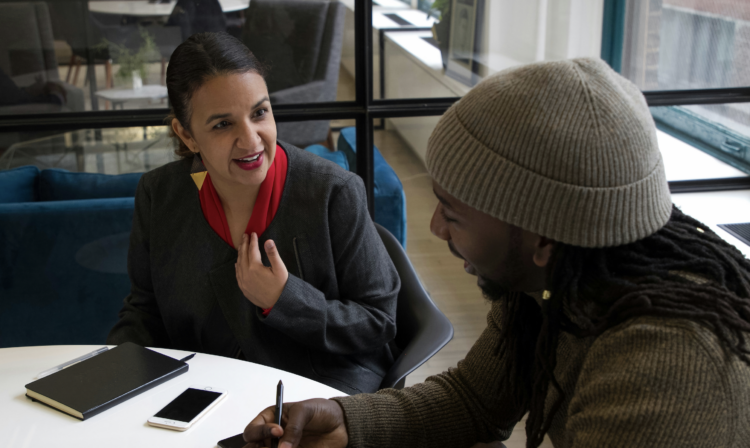In recent years, research interest in knowledge brokerage has expanded across disciplines as scholars and practitioners alike seek to better understand the mechanisms that impact use of research evidence in policymaking processes. With funding from the William T. Grant Foundation, we endeavored upon a multi-year process to bring together scholars from health, education, psychology and communication, and other related disciplines to better understand the state of research with regards to knowledge brokerage. This work culminated in our edited volume, Networks, Knowledge Brokerage and the Public Policymaking Process (published by Palgrave, 2021), which outlines a number of emerging directions at the crossroads of knowledge brokerage, public policymaking, and the use of network analysis to better understand the connections within these spaces.
In the edited volume, we focus on an exploration of what it means to function as a knowledge broker, and how knowledge brokers operate in a variety of settings. This blog posts highlights some of the key themes from our edited volume, and points to emerging research directions such as the role of digital technology.
Knowledge Brokerage and Network Analysis
Knowledge brokerage can improve the use of research evidence in the public policymaking process. Varying stakeholders and competing agendas interact within the broader policymaking ecosystem. That ecosystem broadly consists of policymakers, elites, advocates, and others with a stake in a particular policy. While some actors possess more political power than others to influence public policy, knowledge brokers—i.e., intermediaries who act to facilitate the flow and exchange of policy-relevant knowledge, including research evidence, among actors—may be able to exert direct or indirect influence on policy decisions.
In our edited volume, we advocate for a network perspective because of the potential for network analysis to unpack the structural aspects of knowledge exchange, and further to capture the social context and social interactions that enable it. As a method, network analysis focuses on mapping and analyzing connections that exist between actors in an ecosystem; that mapping allows researchers and practitioners to better understand relationships and connections that catalyze use of research evidence in policy processes.
Knowledge Brokerage and Use of Research Evidence
Research evidence has the potential to improve public policy and professional practice in a wide range of domains, but it is rarely the only, or even the most important, form of evidence considered in policy settings. Use of research evidence too has been largely inconsistent in this setting: research evidence is infrequently used to directly inform policy decisions; it is more commonly used to form or corroborate understanding of issues as well as to justify certain policy decisions or choices. In other words, use of research evidence in policymaking is almost always political.
We know from extant research that use of research evidence in policy is conditional on relationships and routines. Policymakers seek and receive research evidence from sources they trust and depend on for information they value. Their incentives and opportunities to use research evidence are further dictated by institutional routines and norms that regulate their routine policymaking work such as authoring of bills, commissioning reports, and holding public hearings—none of which requires research evidence to be considered or referenced. This means that knowledge brokers who have established relationships with policymakers and whose work is already integrated with institutional routines (e.g., policy advocacy and lobbying activities) are better positioned to broker research evidence. Network mapping and analysis can be useful for identifying brokers that are most likely to be influential in this regard. For instance, Jonathan Purtle’s chapter looks at the preferences of different groups of policy stakeholders and outlines ways in which dissemination strategies should be customized to reach distinct heterogenous groups.
Still, in practice, use of research evidence in policymaking is complex and disorderly; there is rarely a single systematic and calculated process by which research evidence can be integrated into policy decision-making. In our volume, Rosalyn Negron and colleagues examine knowledge sharing amongst a group of transnational immigrants and demonstrate the complexity and nuance of health and immigration policy when implemented within communities.
Indeed, both Negron and Purtle caution that existing pathways and mechanisms through which research is disseminated may not always lead to an increase in the use of research evidence in policy decision-making processes. The most robust path goes through leveraging existing relationships and integrating knowledge brokerage within existing institutional routines (leveraging the organizational connection to form new interpersonal connections).
Knowledge Brokerage and Networks in Practice
Knowledge brokers are frequently touted as having a critical role in the translation and transfer of knowledge. They are expected to perform key functions including knowledge management (providing users with research-based insights tailored to their unique settings and needs), liaison (facilitating direct contacts and collaboration between producers and users of research), and building users’ capacity to access, evaluate, and implement research-based knowledge. This type of practice-oriented work is geared toward the development and testing of knowledge brokering interventions.
Practice-oriented knowledge brokerage research places greater emphasis on the role and functions of knowledge brokers. Network analysis is critical to building this practice-oriented approach. A chapter from Elizabeth N. Farley-Ripple and Ji-Young Yun outlines an ego-network method for mapping research evidence use, while Kathryn Oliver details how to use network analysis to map policy actors and identify key influencers.
At the same time, dissemination of evidence-based practices is rarely sufficient on their own for successful adoption, adaptation, and implementation of such practices in systems and organizations. In this context, transactional forms of knowledge brokerage may not be as effective as one would hope. Rather, knowledge brokers must take on knowledge functions that can support system transition/transformation such as facilitating learning systems, taking the lead on knowledge development for supporting implementation, and engaging practice stakeholders in co-creation of knowledge.
Platforms and Portals as Knowledge Brokers
With an eye towards the future of research examining knowledge brokerage and the use of research evidence, our closing chapters tackle the potential role of technology in supporting knowledge brokerage. Katherine Ognyanova examines processes for evaluating and mitigating the flow of misinformation in communication networks, and Jennifer Lawlor and colleagues unpack the potential of online platforms and web portals as sites of knowledge brokerage. Platforms and portals are increasingly gaining traction as sites of knowledge brokerage, and the traceability of digital interactions means that network analysis is well suited to analyzing interactions in these spaces. To that end, a 2022 special issue in the American Journal of Public Health examined the role of data dashboards in public health. An editorial in the special issue points to the important role of dashboards in making data visually accessible, and in connecting stakeholders to critical information to inform policy outcomes. This perspective begins to frame portals as important intermediary sites that support knowledge brokerage activities – but falls short of portals as actual knowledge brokers.
Portals and online platforms are a critical emerging direction at the intersection of knowledge brokerage and network analysis. Our own work at the state level has focused on the building and dissemination of a web portal for sharing research evidence about adolescent depression screening, with early findings showing that digital dissemination paired with active attempts at brokering can lead to improved engagement with research evidence. At the federal level, a team led by Max Crowley at Penn State is working to build a research-to-policy collaboration network that focuses on collecting research evidence for policymakers via a web portal and online forum.
Knowledge, Networks, and Brokers
Web portals and platforms are just one of many emerging directions for research examining the use of research evidence. Digital technology paired with network analysis allows for a more meaningful understanding of the ways in which research evidence is engaged and utilized by stakeholders. Mapping of networks, and more carefully accounting for use, may also help to reduce inequality by identifying instances where inequality in use takes place. The myriad of pathways for future research are numerous; our hope is that the collection of chapters in our edited volume help to move forward the state of the art with regards to the knowledge, networks and brokers.
Our edited volume provides a comprehensive review of extant research on knowledge brokers and policymaking through the lens of networks. Equally important, by highlighting areas of emerging research such as online platforms as knowledge brokers, the implications of misinformation, and the role of community networks, the collective volume points towards emerging areas of research for future scholarship.






